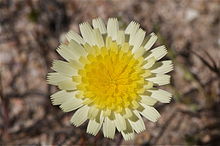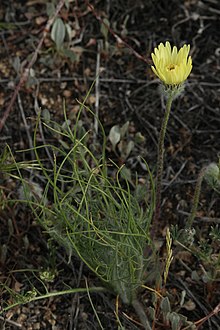| Malacothrix californica | |
|---|---|

| |

| |
| Scientific classification | |
| Kingdom: | Plantae |
| Clade: | Tracheophytes |
| Clade: | Angiosperms |
| Clade: | Eudicots |
| Clade: | Asterids |
| Order: | Asterales |
| Family: | Asteraceae |
| Genus: | Malacothrix |
| Species: | M. californica |
| Binomial name | |
| Malacothrix californica DC. | |
Malacothrix californica is a species of flowering plant in the family Asteraceae known by the common name California desertdandelion. It is native to California, the western margin of Arizona and Baja California, where it may be found especially in the South Coast, Transverse and Peninsular Ranges and the western Mojave Desert.
Involucres (8–)10–15 × 5–6 mm. Phyllaries usually 20–26+ in 2-3+ series, (midstripes often reddish) lanceolate to lance-linear or subulate, unequal, hyaline margins 0.1–0.5 mm wide, abaxial faces (of outermost, at least) shaggily piloso-hirsute to arachnose (at least proximally).
Description
It is an annual herb producing a flowering stem up to about 45 centimeters high. The pinnately lobed linear to lance-shaped leaves are mostly located around the base of the plant. The lobes are generally threadlike to linear. The inflorescence is a flower head borne singly lined with hairy-based phyllaries, usually 20 to 26 or more in 2 to 3 or more series. Each bract often has a red midstripe. The 16–20 millimetres (0.6–0.8 in) head bears rings of ray florets, usually yellow to pale yellow, but sometimes white.
References
- Sullivan, Steven. K. (2018). "Malacothrix californica". Wildflower Search. Retrieved 2018-07-06.
- ^ "Malacothrix californica". in Jepson Flora Project (eds.) Jepson eFlora. Jepson Herbarium; University of California, Berkeley. 2018. Retrieved 2018-07-06.
External links
 Media related to Malacothrix californica at Wikimedia Commons
Media related to Malacothrix californica at Wikimedia Commons- Flora of North America
- Photo gallery
| Taxon identifiers | |
|---|---|
| Malacothrix californica |
|
This Cichorieae article is a stub. You can help Misplaced Pages by expanding it. |